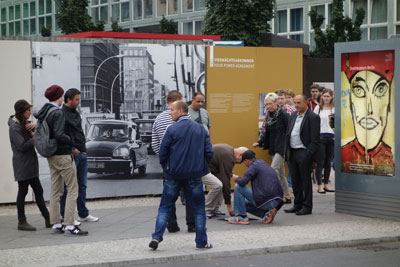Avoiding scams and pickpockets
This item appears on page 59 of the May 2014 issue.
The Louvre is Europe’s oldest, biggest, greatest and second-most-crowded museum (after the Vatican). It is home to Mona Lisa, Venus de Milo, Michelangelo statues, and paintings by the greatest artists from the Renaissance to the Romantics. Lately, it is also home to groups of pickpockets. It got so bad that in April 2013 the museum staff walked out in protest. The Louvre had to close for a day, and the management finally beefed up police patrols.
Europe is a surprisingly creative place when it comes to petty thievery and travel scams. Tourists, especially Americans, are easy targets. Be on guard… even at church. St. Mark’s Basilica in Venice attracts tourists and pickpockets alike. Loaded down with valuables, jet lagged and bumbling around in a strange new environment, we stick out like jeweled thumbs. If I were a European thief, I’d specialize in Americans. My card would say “Yanks R Us.”
But scams can be avoided. Smart travelers are less likely to be victims, so be aware of these travel scams, which I’ve been tracking, thanks to my readers and my European travel guides.
Rotator Bluff — You’re going through a London subway turnstile and someone is pressing right behind you. You feel something in your pocket, but by the time you turn around it’s already too late. The thief throws your wallet to his accomplice on the other side of the machines. You’re stuck on the wrong side of the turnstile, and both thieves have disappeared into the crowd.
The Attractive Flirt or New “Friend” — You’re a single male traveler who is suddenly approached by a gorgeous woman on the street. After chatting for a while, she seductively invites you for a drink at a nearby nightclub. But when the bill arrives, it is several hundred dollars more than you expected. Only then do you notice the burly bouncers guarding the exits, so you have to pay up.
There are several variations on this scam. Sometimes the scam artist is disguised as a lost tourist or a gregarious local who (seemingly) just wants to show you his city. Regardless, be suspicious when invited for a drink by someone you just met. If you want to go out together, suggest a bar (or café) of your choosing instead.
Slow Count — Cashiers who deal with lots of tourists thrive on the “slow count.” Even in banks, they’ll count your change back with odd pauses in hopes that you’ll gather up the money early and say ‘Grazie.’
Waiters seem to be arithmetically challenged. If you have to use a large bill to make a small payment, clearly state the value of the bill as you hand it over. Some waiters or cabbies will pretend to drop a large bill and pick up a hidden small one in order to shortchange a tourist. Get familiar with the currency and check the change you’re given.
The Well-Dressed Thief — The sneakiest pickpockets look like well-dressed businesspeople, generally with something official-looking in their hand. Some pose as tourists with daypacks, cameras and even guidebooks. Don’t be fooled by looks, impressive uniforms, femmes fatales or hard-luck stories. Don’t hand your wallet to anyone, especially not to fake police who want to “check it for counterfeit money.”
The Shell Game — Avoid any gambling on the street. The classic shell game comes with a shill who wins money easily. Then it’s your turn. Believe it or not, there are enough idiots on the street to keep these con men in business.
Good Luck and Good Love — In many countries, colorfully dressed women are notorious for aggressively approaching the unknowing tourist with friendship bracelets or sprigs of rosemary. They’ll tell you your fortune and promise you a wonderful love life. Then they’ll demand money and refuse coins (bad luck), so the confused tourist gives paper money.
This can also lead to a commotion where their children will gather around, and suddenly everyone’s gone and all your zippers are down. It’s best to just stay away from any seemingly spontaneous interaction like this on the streets.
The Excuse Me Spill — A popular con is when someone squirts your shirt with gunk and then tells you it’s bird poop. While she helps clean it up, an accomplice lifts your purse or backpack.
And the list goes on and on. Scams can be easy to avoid if you recognize them and stay aware. Assume any commotion is created by thief teams to create a cover for their work. Wear a money belt to protect yourself against pickpockets, and leave your fancy bling at home.
Above all, enjoy your trip. Don’t travel fearfully; travel smartly. Scam artists come in all shapes and sizes, but if you’re cautious and not overly trusting, you’ll marvel at how easy it is to have a fun and hassle-free vacation.

